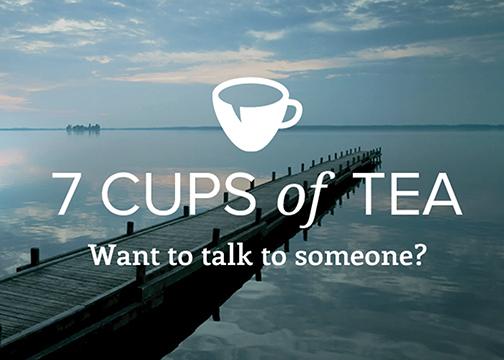
A recent survey conducted by the University of California, Los Angeles Cooperative Institutional Research Program showed that the mental health of college freshmen has reached an all-time low. Students can now download an app that may be able to help.
The free mobile app and website, 7 Cups of Tea, allows college students to get 24/7 emotional support in the form of a trained listener. The conversations are held anonymously, where the volunteer listeners don’t give advice, but listen and give people an opportunity to vent.
7 Cups of Tea was created by Glen Moriarty, a licensed psychologist and a psychology professor at Regent University. While studying human behavior that had moved online (such as shopping, dating and friendships), he realized mental health treatment had not kept up.
In response, he created a medium for people to go online and get mental help, in the form of a leisurely, friendly conversation.
He realized technology meant more access for people in need.
“I’m a psychologist and I care about helping people,” Moriarty said. “You can’t help that many people with the current mental health system.”
The app launched in July 2013 with the help of Y Combinator, a seed accelerator that has funded companies such as Airbnb, Dropbox and reddit. The app focuses on having the student, or a user of any demographic, talk through their problems. The app works through text as well as voice calls if the users feel comfortable.
Users can request specific listeners to find a better match.
According to the app’s website, volunteer listeners have all been interviewed and completed the Active Listening training program.
They often have an interest in mental health.
University of Wisconsin–Oshkosh healthcare science and neuroscience senior Anna Hirsch had worked with crisis hotlines before and, upon finding the website, she decided it was a good way to help people and became a listener.
“I talk to various members about relationship issues, their anxiety or depression,” Hirsch said. “There’s a pretty wide variety to what people are dealing with. I just listen and help brainstorm ideas for dealing with them.”
She explained that she liked the work and that she had a personal stake in it.
“I myself have struggled with anxiety and I wanted to give back,” she said.
San Diego State child development sophomore Michelle Ferguson said the app was a good idea for people with limited time, like college students.
“I think it’s a great thing for college students to have access to on a temporary basis if you’re having occasional anxiety,” Ferguson said. “If I was starting to panic in the middle of the night, I think it would be useful to have someone to go to. It’s good if you have no else to talk to.”
Moriarty said the app currently holds more than 90,000 conversations a week.
“Just the listener connection, I think, is the most important part,” Moriarty said.








